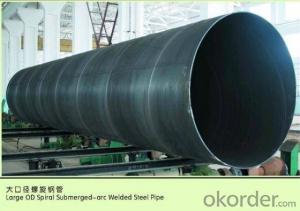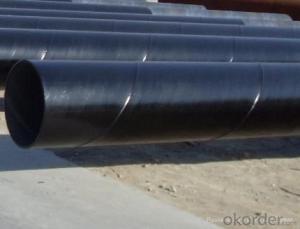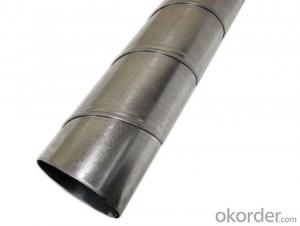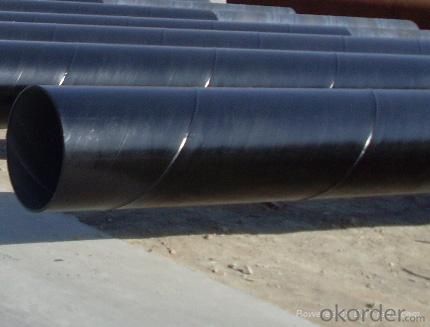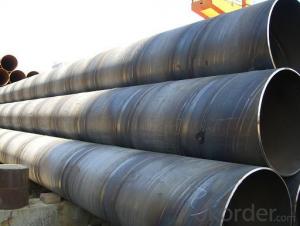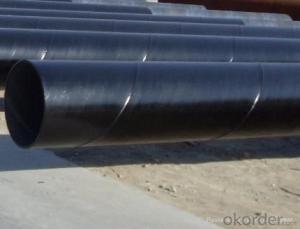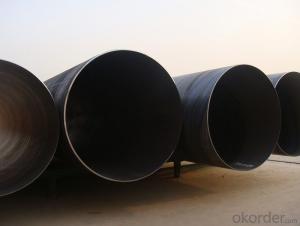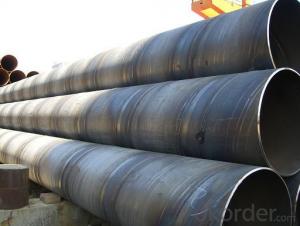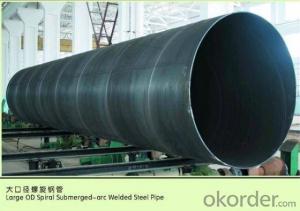SPIRAL STEEL PIPE 16‘‘
- Loading Port:
- China Main Port
- Payment Terms:
- TT OR LC
- Min Order Qty:
- -
- Supply Capability:
- -
OKorder Service Pledge
OKorder Financial Service
You Might Also Like
Packaging & Delivery
Packaging Detail: | standard export packing or as customer's requirement |
Delivery Detail: | within 10 - 30 days |
Specifications
Spiral Welded Steel Pipes and Tubes
1.Material:Q195-Q235
2.Length:1-12m
3.WT:1.0-14mm
4.O.D.:20-273mm
Spiral Welded Steel Pipes and Tubes
Product Description:
1.Material : Q235,Q345,L245,L290,L360,L415,L450,L485,GrB,X42,46,X52,X56,X60,X65,X70,X80,X100
2,Standard: SY/T5037-2000,GB/T9711-2011,API Spec 5L PSL1/PSL2,ASTM A252\A53,ISO3183,DIN17172,EN10217,JIS G3457,AWWA C200,ASTM A139,ASTM A671,ASTM A672
3.Wall thickness: 3.0mm-30mm
4.Outer diameter: φ168mm-3020mm
5,Length: 5m-12m or as your requirement
6,Corrosion protection standard: DIN30670,DIN30671, AWWAC210, AWWA C203, SY/T0413-2002,SY/T0414-2002
7,Application: Oil, gas, natural gas, water pipe, thermal electricity pipe, steel structure engineering, etc
Q195-q345 Material Steel Pipe's Materials
Elements | Chemical Compsition% | Mechanical Property | ||||||
| C% | Mn% | S% | P% | Si% | Yield Point (Mpa) | Tensile Strength(Mpa) | Elongation |
Q195 | 0.06-0.12 | 0.25-0.50 | <0.050 | <0.045 | <0.030 | >195 | 315-430 | 32-33 |
Q215 | 0.09-0.15 | 0.25-0.55 | <0.05 | <0.045 | <0.030 | >215 | 335-450 | 26-31 |
Q235 | 0.12-0.20 | 0.30-0.70 | <0.045 | <0.045 | <0.030 | >235 | 375-500 | 24-26 |
Q345 | <0.20 | 1.0-1.6 | <0.040 | <0.040 | <0.55 | >345 | 470-630 | 21-22 |
- Q: How do steel pipes compare to ductile iron pipes?
- Steel pipes and ductile iron pipes are both commonly used in various applications, but they have some differences in terms of their properties and advantages. 1. Strength and Durability: Steel pipes are typically stronger and more durable than ductile iron pipes. Steel has a higher tensile strength, making it less susceptible to cracking or breaking under pressure or external forces. Ductile iron, on the other hand, has a lower tensile strength but has better impact resistance than steel. 2. Corrosion Resistance: Steel pipes are prone to corrosion, especially when exposed to moisture or chemicals. However, they can be protected by applying coatings or using corrosion-resistant alloys. Ductile iron pipes, while inherently more corrosion-resistant than regular cast iron, may still require external protection to prevent rusting and degradation. 3. Flexibility: Ductile iron pipes have greater flexibility than steel pipes. They can withstand certain degrees of bending and deflection without fracturing, making them suitable for applications where ground movement or shifting might occur. Steel pipes are less flexible and more rigid, making them better suited for straight runs or applications with minimal movement. 4. Cost: Generally, ductile iron pipes are more cost-effective than steel pipes. Ductile iron is easier and cheaper to manufacture, resulting in lower production costs. However, steel pipes may have a longer lifespan, requiring fewer replacements over time, which can offset the initial cost difference. 5. Installation: Steel pipes are lighter and easier to handle during installation compared to ductile iron pipes, which can be heavy and bulky. The lighter weight of steel pipes can reduce labor and transportation costs. Additionally, steel pipes can be welded, allowing for more flexible installation options, while ductile iron pipes are typically joined using mechanical couplings or flanged connections. In summary, steel pipes offer superior strength and durability, while ductile iron pipes provide better flexibility and cost-effectiveness. The choice between the two depends on the specific requirements of the application, including factors such as corrosion resistance, expected loads, installation conditions, and budget constraints.
- Q: What is the role of steel pipes in the construction of stadiums?
- Steel pipes play a crucial role in the construction of stadiums as they are used for various purposes including structural support, drainage systems, and the installation of utilities such as water, gas, and electrical lines. These pipes provide the necessary strength and durability to support the weight of the stadium's roof, seating areas, and other infrastructure. Additionally, steel pipes enable efficient transportation of liquids and gases, ensuring proper functioning of the stadium's facilities.
- Q: How are steel pipes protected during transportation and storage?
- Steel pipes are typically protected during transportation and storage through various measures such as corrosion prevention coatings, wrapping them with protective materials like plastic or rubber, and securing them properly to prevent any damage or movement.
- Q: Seamless steel tube DN15 specification phi 18*3 what do you mean?
- Seamless steel pipe DN15 specification phi 18*3 refers to 3 outer diameter of 18mm B type DN15 seamless steel tube.
- Q: What is the difference between steel pipe and PVC pipe?
- Steel pipe and PVC pipe are both commonly used materials for plumbing and other construction applications, but they have several key differences. Firstly, the material itself is different. Steel pipe is made from steel, which is an alloy of iron and carbon. It is known for its strength and durability, making it suitable for high-pressure applications and underground installations. On the other hand, PVC (polyvinyl chloride) pipe is made from a type of plastic known as PVC. It is lightweight, flexible, and easy to handle, making it a popular choice for residential plumbing and irrigation systems. Secondly, the installation process differs. Steel pipe requires skilled labor and specialized tools for cutting, threading, and welding. It often involves a complex installation process, especially for larger pipe sizes. PVC pipe, on the other hand, can be easily cut with a saw or specialized pipe cutter and joined together using solvent cement or threaded fittings. This makes PVC pipe more suitable for do-it-yourself projects and simpler installations. Thirdly, steel pipe has a higher cost compared to PVC pipe. Steel is a more expensive material, and the manufacturing process for steel pipe is more complex, involving multiple steps and additional materials. PVC pipe, being made from plastic, is generally cheaper and more cost-effective, especially for smaller diameter applications. In terms of performance, steel pipe has higher tensile strength, can withstand higher pressure, and is more resistant to temperature changes, making it ideal for heavy-duty and industrial applications. PVC pipe, on the other hand, has a lower tensile strength but is resistant to corrosion, chemicals, and scale buildup. It is commonly used in residential plumbing, irrigation systems, and other non-industrial applications. In summary, the main differences between steel pipe and PVC pipe lie in the material, installation process, cost, and performance characteristics. While steel pipe is stronger and more suitable for heavy-duty applications, PVC pipe is lighter, easier to install, and more cost-effective for residential and non-industrial uses.
- Q: What are the different methods of protecting steel pipes from external damage?
- There are several methods of protecting steel pipes from external damage, including coating the pipes with a corrosion-resistant material such as epoxy or polyethylene, applying a layer of protective tape, installing a cathodic protection system, using concrete or rock shielding, and implementing measures to prevent soil movement or impact damage.
- Q: What are the different grades of steel pipes?
- There are several grades of steel pipes, including ASTM A53, ASTM A106, and API 5L. These grades vary in terms of their composition, strength, and intended use.
- Q: How are steel pipes protected from corrosion in corrosive environments?
- Steel pipes are protected from corrosion in corrosive environments through various methods such as coating the pipes with corrosion-resistant materials like epoxy or zinc, using cathodic protection techniques, and implementing regular inspections and maintenance to identify and address any potential corrosion issues.
- Q: Welded and seamless steel pipe how to distinguish?
- Generally, careful observation, can see traces of the weld seam pipe, further is the determination of the polished incision, and then with the file can be seen there is no clear cut, interface traces with the file cleanup to remove when cutting was pasted interface.
- Q: What are the common applications of seamless steel pipes?
- Due to their unique properties, seamless steel pipes are widely used in various industries. Here are some of the most common applications: 1. The oil and gas industry extensively utilizes seamless steel pipes for transporting oil, gas, and other fluids. These pipes are preferred because of their high strength, durability, and resistance to corrosion, making them suitable for harsh environments. 2. Seamless steel pipes are extensively used in construction projects, such as building, bridge, and tunnel construction. They are ideal for structural applications due to their ability to withstand heavy loads and provide excellent strength and stability. 3. The automotive industry relies on seamless steel pipes for manufacturing automotive parts, including exhaust systems, engine components, and hydraulic systems. These pipes offer high strength, reliability, and resistance to heat, making them suitable for demanding automotive applications. 4. Various mechanical and engineering applications benefit from the usage of seamless steel pipes. They are commonly used for carrying fluids, gases, and steam, as well as for transmitting power in machinery and equipment. 5. Power plants extensively utilize seamless steel pipes for transporting steam and hot water. These pipes are capable of withstanding high pressure and temperature, making them ideal for power generation applications. 6. The petrochemical industry heavily relies on seamless steel pipes for transporting chemicals, gases, and liquids. These pipes have excellent resistance to corrosion, which is essential when dealing with hazardous and corrosive substances. 7. The mining industry utilizes seamless steel pipes for various applications, including the transportation of slurry, water, and other mining-related fluids. These pipes offer durability, reliability, and resistance to abrasion, making them suitable for the challenging mining environment. 8. The aerospace industry finds applications for seamless steel pipes in manufacturing aircraft components, such as hydraulic systems, fuel lines, and structural parts. These pipes provide a high strength-to-weight ratio and resistance to extreme temperatures and pressure. Overall, seamless steel pipes play a crucial role in a wide range of industries. Their exceptional properties, including strength, durability, resistance to corrosion and high temperatures, make them an essential component in various industrial processes and infrastructure development.
Send your message to us
SPIRAL STEEL PIPE 16‘‘
- Loading Port:
- China Main Port
- Payment Terms:
- TT OR LC
- Min Order Qty:
- -
- Supply Capability:
- -
OKorder Service Pledge
OKorder Financial Service
Similar products
Hot products
Hot Searches
Related keywords
